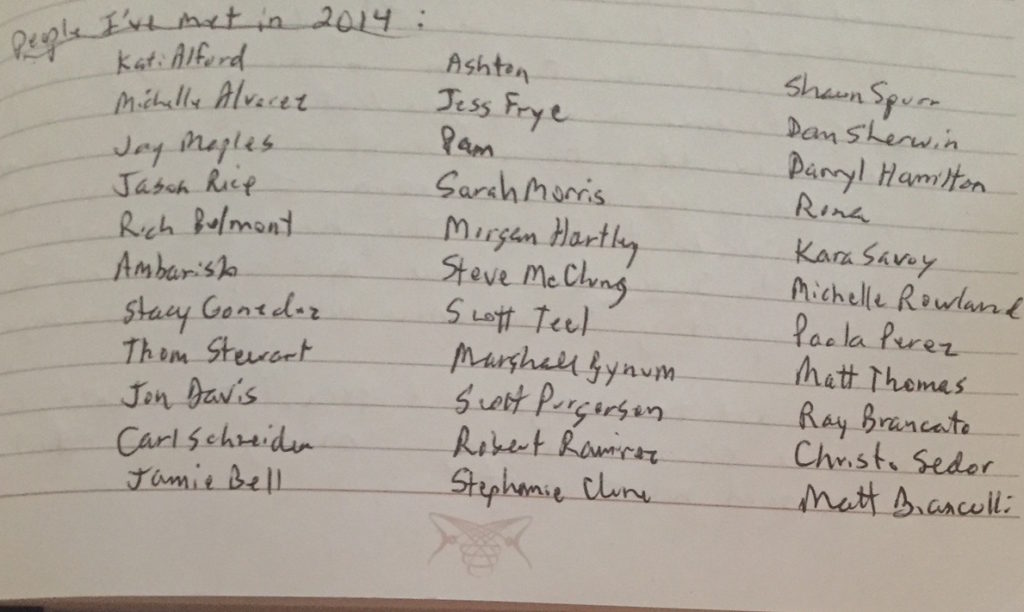On the Bigger Pockets Podcast, I mentioned that if I had to attribute one thing, to whatever successes I’ve had, it would be: keeping a journal.
Here’s when I realized its value. It was March 2017. I’d just returned from taking Man O clients to the Gellert Baths in Budapest, Hungary (highly recommend). I checked my email to see that I had one from one of my best buds from high school, Eric Johnson. Here’s what it said:
Dizzle, (note: we came up in the Snoop Dogg era)
I’ve heard you mention the importance of journaling and the positive impact it’s had on your life.
A lot of successful people I know follow the same practice. It’s been on my mind a lot lately, but I’ve never done it.
How do you start? Is it more of a profession-based mind dump. For example, things you experienced at work that day, lessons learned and goal setting type stuff.
Is it personal life stuff or a combination of it all? How would you suggest I organize it and get started?
I feel strongly for some reason it will improve all aspects of my life. Just not sure how to approach it.
My thoughts are to start writing down all of it. And reflecting on it to gauge my growth.
Am I thinking in the right direction??
Would love to hear any input you can provide! – E
Eric is an accomplished, hard-working family man, father of four. Still, he was looking for ways to grow, which fired me up. The thoughtfulness and humility in his email had me crafting a detailed response.
A Tool for Success
As I articulated the benefits of journaling for “E,” it hit me. Keeping track of all the times things worked out (and didn’t); looking at where I took risks (and didn’t); all the instances I said the wrong thing, brightened someone’s day or achieved a goal, it was all documented.
In a way, it felt like I’d written my own narrative. It seems the same way you can design the interior of your house, you can design a life. When I was asked to share the impact journaling had on me, I wanted to say, “It’s the tool I’ve used to accomplish everything!”
From second-grade up to college, I wasn’t interested in anything I was forced to study. Fortunately, the most important things to study in life aren’t taught in school. The most important things to study are yourself, your environment, and basic ideas from multiple disciplines.
A journal is a tool that can be leveraged to become a student of multiple disciplines and your own life.
“The purpose of learning is growth, and our minds, unlike our bodies, can continue growing as we continue to live.”
Mortimer Adler, author of How to Read a Book
We are Living in a Golden Era
We’re now living through what I call The Golden Era of Self-Directed Learning. Formalized education is becoming less valuable even as it gets more expensive. Since I graduated from college in 2003, student-loan debt has risen 457%—the total deficit is more than $1.5 trillion.
We spend precious time in universities listening to professors yap about something they’ve read in a book that they often haven’t done themselves. Many of those books we can now access for free. Furthermore, you can log on to Youtube and learn almost anything.
While schools tend to kill curiosity in favor of compliance, our era is a godsend to the audodidact. They can get the equivalent of a four-year degree at no charge—the only cost is his/her attention.
“I have never let my schooling interfere with my education.”
Mark Twain
What You Need to Know
I became a voracious learner when I finished school, cultivating self-awareness. I studied great thinkers and subjects that interested me, in my own way, at my own pace: Human nature, psychology, biology, persuasion, public speaking, emotional intelligence, etc.
You can do the same.
Of course I had to pay big money to access materials. This forced me to get efficient at acquiring basic knowledge and skills so I could maximize input per expenditure. Each piece of knowledge I learned strengthened the other. High costs of acquisition [of new materials] forced me to re-read books and re-listen to cassette tapes & CDs. It was a blessing in disguise, however, since repetition is the mother of learning.
Here’s my advice. Gather knowledge from a wide variety of sources, get an accurate gauge of yourself, and understand how your surroundings influence your thinking. In your journal, assimilate what you’ve learned and track your personal growth.
“Life is just one damn relatedness after another.”
Julian Huxley
Once combined, the output of your knowledge produces results that have far more value than the sum of its parts.
Having a broad array of knowledge means you will understand more of what you encounter in life, enabling you to accelerate your learning. For example, a speech-writer who reads constantly can quickly scan a blog post and find the “meat” he wants to use for an upcoming speech, rather than read through details the blogger shares from his diary.
Keeping a Diary
Consider this a warning. You will be made fun of for keeping a “diary” like a teenage girl. I still get mocked. When it happens to you, smile. You’re playing the long game.
Your journal is a place to capture everything you’re studying over time. Once filled, it will contain ideas for how to improve your relationships, investments, time-management, decision-making, etc.
Anything you encounter in life that’s worth remembering, write it down. It’s one thing to hear or read an idea or quote that could serve you in the future. It’s another thing to read or hear an idea or quote, then make the effort to write it down. Those words you’ve captured on paper will stick if you revisit them. Over time, they’ll be firmly etched in your mind.
There are quotes I began internalizing in 2004 that have served as guiding principles, like this one:
“Make a rule of life never to regret and never to look back. Regret is an appalling waste of energy; you can’t build on it; it’s only good for wallowing in.”
Katherine Mansfield
My first journal was a shitty spiral notebook. The contents weren’t worth much either. I didn’t know where to start. Here is my first-ever journal entry, dated Monday, September 7, 1998:
“Rent is $590/month. Mark got his own room b/c he is oldest. There is 3 of us: Me, Jeff, Mark. Jeff has 2 red-tailed boas.”
My second journal entry was: “Mark McGwire broke Roger Maris’ homerun record. 62.”
Not a lot of value in there. Plus, I mistakenly wrote, “There is.” If you’re not embarrassed by what you’ve written in your journal ten years from now, you’re doing it wrong. Most importantly, in the beginning, developing the habit is far more important than the content.
Before I get into why you should keep a journal, some advice on how much you should spend: A lot. Challenge yourself to put thoughts and ideas into your journal that are worth the price you paid for it. I’ve gone from a POS spiral to a leather-bound treasure trove of life-changing quotes and $50,000 ideas. It’s even got a fancy satin bookmark that feels like the bedsheets I reserve for special occasions.
Why Keep a Journal
In keeping a journal, you’re simplifying the world by equipping yourself with a tool to think better, make revisions in your thinking and solve problems. You’ll develop clarity as your thoughts become more organized.
The detachment and objectivity journaling requires leaves no room for bullshit. You’re examining the truth of your problems. You may even catch your bullshit, and see where you’re fooling yourself (and remember you’re the easiest person to fool).
I’ve never seen any life transformation that didn’t begin with the person in question finally getting tired of their own bullshit.
Elizabeth Gilbert
There is immense complexity in the world. We don’t intuitively think about the billions of variables that lead to results. One of the strengths (and weaknesses) of the human mind is that it’s quick to establish cause and effect. We only see surface-level outcomes.
A journal will help you to guard against cognitive biases, review your thought processes, and get better at separating decision from outcome. As a result, your decision-making will improve.
In my first solo podcast, I discussed professional poker players making quick decisions based on limited information. Phil Ivey is one of the best poker players in the world. Yet, after he wins a tournament, he deconstructs every potential playing error that he made so that he can make better decisions next time. As a result, his brain quickens.
A large part of the difference between the experienced decision-maker and the novice in these situations is not any particular intangible like “judgment” or “intuition.” If one could open the lid, so to speak, and see what was in the head of the experienced decision-maker, one would find that he had at his disposal repertoires of possible actions; that he had checklists of things to think about before he acted; and that he had mechanisms in his mind to evoke these, and bring these to his conscious attention when the situations for decisions arose.
Herbert Simon
Journaling will speed up your brain processes. Warren Buffet once said of Charlie Munger, “He is truly the broadest thinker I have ever encountered, the best 30-second mind in the world. He goes from A-Z in one move. He sees the essence of everything before you even finish the sentence.”
The Colbert Report was a case-study for the quickened brain. Stephen Colbert could be talking to the smartest guy in the state of New York, but it was clear he could think faster than they could.
What to Write in Your Journal
In your journal, write your goals. Record your observations. Write down what you did and who you met. Scribble notes on how the interaction made you feel.
Did the person make an impression? Did their words resonate or have an impact? Write it down.
Underline every name. There’s nothing more important than people and relationships. Dale Carnegie said a person’s name is the sweetest sound in the English language (at least to them).
Nobody you respect or admire says, ‘I’m terrible with names.’
Man Overseas
Another reason to underline a person’s name is to make it easy to find when you’re reviewing the previous year. On December 31, I collect the names of people I’ve met that year in one place, and figure out who I want to develop relationships with, both personally and professionally.

What Else Should I Write?
Ideas for what to write in your journal can come from anywhere:
- conversation with a friend
- meeting at work
- conference or seminar
- sermon
- reading a book
- scrolling Twitter
- watching a documentary
If you’re facing a dilemma, write it down. Worried about a decision? Grab your journal. Did you find a solution to your problem? Write. How’d the situation turn out?
It doesn’t matter if what you journaled about went well or didn’t, both have value. Study the wins AND losses.
If you write things you’re grateful for, you’ll find yourself grateful for more things. Consequently, your peace and happiness will increase, which for me are interchangeable.
Don’t be ashamed of your errors. Be ashamed if you make the same mistake twice. It is far better to avoid mistakes than it is to be brilliant.
“Some may say [journal keeping] is a great deal of
Wilford Woodruff
trouble. But we should not call anything trouble which
brings to pass good. I consider that portion of my life
which has been spent in keeping journals…to have been very
profitably spent. If there was no other motive in view
[except] to have the privilege of reading over our journals
and for our children to read, it would pay for the time
spent in writing it.”
Another reason to journal is you’ll pay greater attention to the world. Life will come alive and start to pop.
If you can’t find enough reason to journal, think of it as benefiting others, for generations to come. How much would you pay to read your great-grandfather’s journal from February 1919?
Someday your kids will be glad you kept a journal, as will their kids. Start now.




Spot on with this write-up, I honestly believe this web site needs a lot more
attention. I’ll probably be back again to read through more, thanks for the advice!
Thanks, lamp!